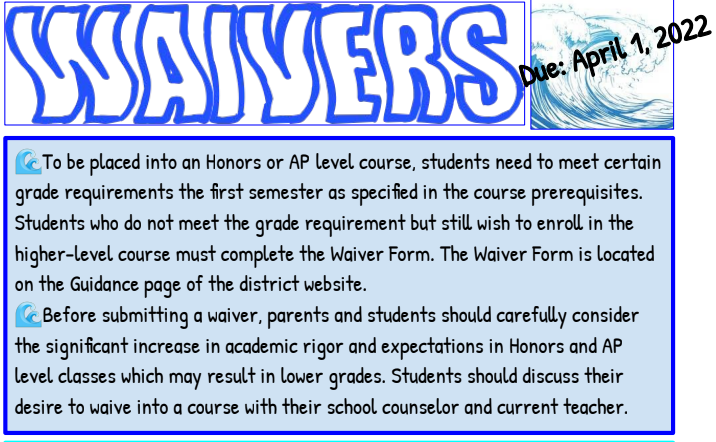New course waivers allow students full autonomy over schedule
With roughly 30 percent more difficult and demanding requirements than an honors class, a well-rounded and rigorous student must earn the credentials to be placed into an AP class. Typically, a student must earn at least a B or B+ average in an honors course or an A in a CPA course to be considered for an AP course. On top of keeping up the grades, a student must attain a teacher recommendation before being accepted into the course. Despite all of these prerequisites, hundreds of West Essex students are enrolled in AP classes each year.
From sciences, to mathematics, to humanities, to music, students have the opportunity to earn college credits for practically any class. Earning college credits in high school is quite the achievement, hence the need for so many rigorous prerequisites. However, starting this year, students now have the option to skip the grade requirement and simply sign a waiver stating that they understand the strictness that comes with an AP class.
“The way that it works is that students would fill out the waiver form and indicate what they’re currently taking, the course they are recommended for and then the course that they are hoping to take in place of that,” guidance counselor Kimberly Greulich said.
The process is simple. If a student wants to challenge themself above the class they were recommended for, they have the option to do so. Of course, clear communication between the student and the teacher is highly recommended before waiving into a higher level course, but ultimately it is the student’s decision. Teachers have little say in the matter, other than their original recommendation.
What makes the waiver process so unique compared to previous years is that students do not have to meet the grade requirement for their desired course. The only requirement is that students take the appropriate prerequisite classes prior to their desired course. For example, a student cannot appeal for Algebra II before taking Geometry.
“I think the benefit of it is that we provide an increased level of access to these courses and allow students some autonomy, hopefully responsibly, where they want to focus their energy and effort in their high school curriculum,” Greulich said.
On the contrary, there is the risk that some students may abuse this policy until it ultimately backfires. On paper, a transcript full of honors and AP courses looks impressive, but when the grades fail to compensate, it can become a messy process. Either the student will have to deal with unappealing grades or go back to the original recommended course, which may cause future scheduling conflicts.
“We talked with guidance counselors about having honest conversations with students about the move from honors to AP, or even the move the eighth to ninth grade. Students just might not be aware of what those expectations are and think ‘Oh, I like English so I can just be in honors,’” English supervisor Stacy Casias said.
Students that chose classes for next year are aware of the new waiver policy and express differing opinions. Some are in favor of student autonomy and believe that students should have more of a say in choosing their placement.
“In my opinion I like having waivers because it allows us to have more of a say in which classes we take. We don’t have to plead our case or anything like in the original appeal process,” sophomore Chloe Berger said.
Others understand the potential risks of the new policy but understand that students must responsibly consider the substantial difficulty and workload difference.
“Overall I think the waivers are a good thing but in some cases I believe that it waters-down the prestige it takes to actually earn a spot in an honors or AP class. In the end it’s their choice though,” junior Sean Ryan said.
Waivers for the 2022-2023 school year were due April 1, bringing an unofficial end to strict guidelines for honors and AP classes. Gone are the days of writing a written claim to plead into a higher ranked class in the appeal forms. The desire to test one’s academic ethic is now ultimately up to the student.








